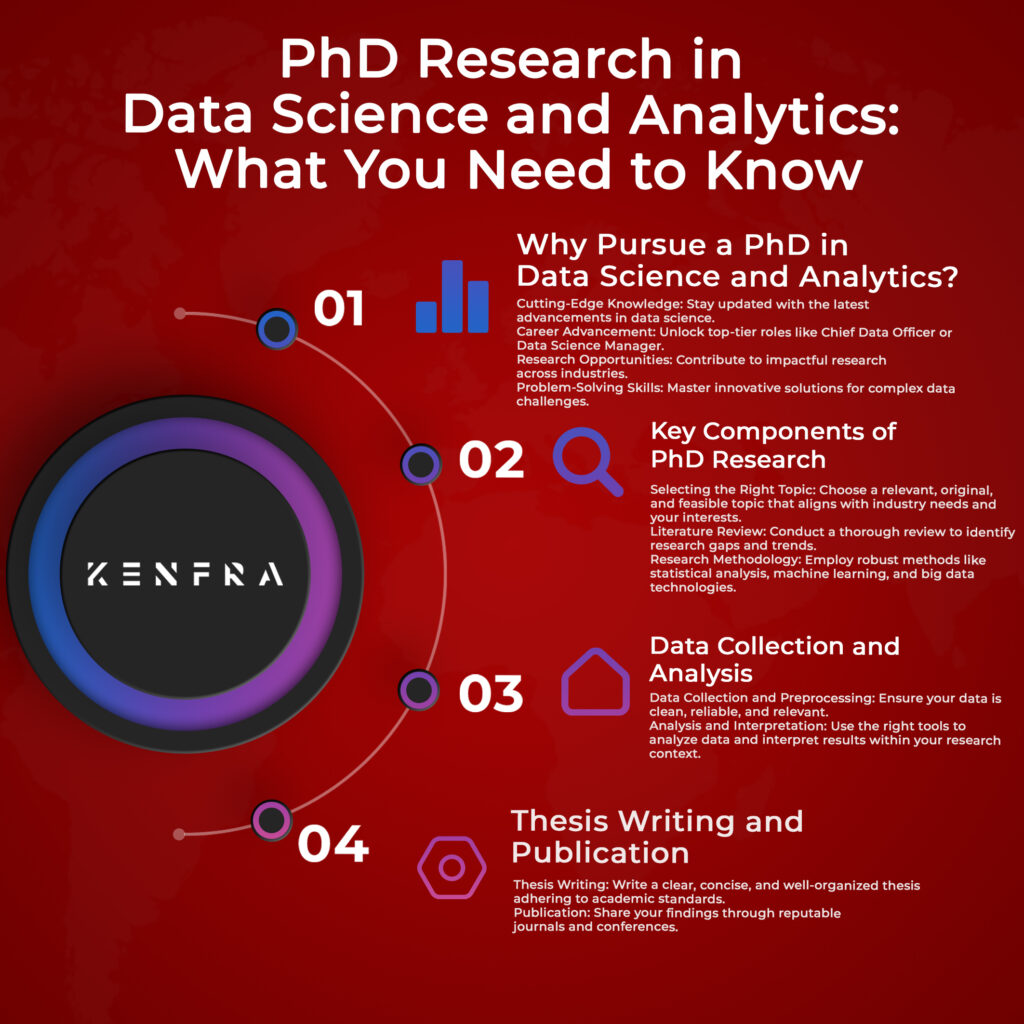PhD Research in Data Science and Analytics: What You Need to Know
Kenfra2024-08-21T10:36:25+05:30PhD Research in Data Science and Analytics: Essential Guide and Topic Selection Tips
Embarking on a PhD journey in Data Science and Analytics is both exciting and challenging. This field combines statistics, computer science, and domain-specific knowledge to analyze and interpret complex data. As industries increasingly rely on data-driven decisions, the demand for skilled data scientists and analysts continues to grow. In this blog, we will cover what you need to know to succeed in this field, including how to select the right topic for your research. For comprehensive support, contact Kenfra Research.
Why Pursue a PhD in Data Science and Analytics?
A PhD in Data Science and Analytics opens doors to advanced career opportunities in academia, industry, and research. Here are some compelling reasons to pursue this advanced degree:
- Cutting-Edge Knowledge: Stay at the forefront of technological advancements and methodologies in data science.
- Career Advancement: Qualify for high-level positions such as Chief Data Officer, Data Science Manager, or academic roles.
- Research Opportunities: Contribute to groundbreaking research that can impact various industries.
- Problem-Solving Skills: Develop the ability to tackle complex data challenges with innovative solutions.
Key Components of PhD Research in Data Science and Analytics
1. Selecting the Right Topic
Choosing a research topic is a critical step in your PhD journey. It should be relevant, original, and feasible within your timeframe and resources. Here are some tips for selecting the right topic:
- Identify Gaps: Review current literature to identify gaps and potential areas for exploration.
- Industry Relevance: Consider topics that have practical applications and can solve real-world problems.
- Personal Interest: Choose a topic that aligns with your interests and career goals.
For personalized guidance in selecting the right topic, contact Kenfra Research.
2. Literature Review
Conducting a thorough literature review is essential to understand the existing research landscape. It helps you identify trends, methodologies, and key findings that can inform your research.
3. Research Methodology
Your research methodology should be robust and appropriate for your chosen topic. Common methodologies in data science include:
- Statistical Analysis: Techniques such as regression, hypothesis testing, and time series analysis.
- Machine Learning: Algorithms for classification, regression, clustering, and deep learning.
- Data Mining: Discovering patterns and knowledge from large datasets.
- Big Data Technologies: Tools and frameworks like Hadoop, Spark, and NoSQL databases.
4. Data Collection and Preprocessing
Gathering and preprocessing data is a crucial step. Ensure that your data is clean, reliable, and relevant to your research questions. Techniques for data preprocessing include:
- Data Cleaning: Handling missing values, outliers, and inconsistencies.
- Data Transformation: Normalization, scaling, and encoding categorical variables.
- Data Integration: Combining data from multiple sources.
5. Analysis and Interpretation
Analyze your data using appropriate tools and techniques. Interpret the results in the context of your research questions and objectives. Visualization tools such as Tableau, Matplotlib, and Power BI can help you present your findings effectively.
6. Thesis Writing and Publication
Writing your thesis is a critical component of your PhD. It should be clear, concise, and well-organized. Adhering to academic standards and citation guidelines is essential. Aim to publish your research in reputable journals and conferences to share your findings with the wider community.
Conclusion
Pursuing a PhD in Data Science and Analytics is a rewarding endeavor that can significantly impact your career and the field as a whole. By selecting the right topic, employing rigorous methodologies, and effectively communicating your findings, you can make meaningful contributions to the world of data science.
For expert guidance on your PhD journey, including selecting the right research topic, contact Kenfra Research. Our team of experienced professionals is here to support you every step of the way.
FAQ
Q1: How do I choose a research topic for my PhD in Data Science and Analytics?
A: Start by identifying gaps in the current literature, considering industry relevance, and aligning the topic with your personal interests and career goals. For personalized assistance, contact Kenfra Research.
Q2: What are common research methodologies in Data Science?
A: Common methodologies include statistical analysis, machine learning, data mining, and big data technologies.
Q3: Why is a literature review important?
A: A literature review helps you understand the existing research landscape, identify trends, and find gaps that your research can address.
Q4: How can I ensure my data is reliable?
A: Ensure your data is clean, relevant, and properly preprocessed. Techniques include data cleaning, transformation, and integration.
By following these guidelines and leveraging expert support, you can navigate your PhD research journey with confidence and success.










Leave a Reply